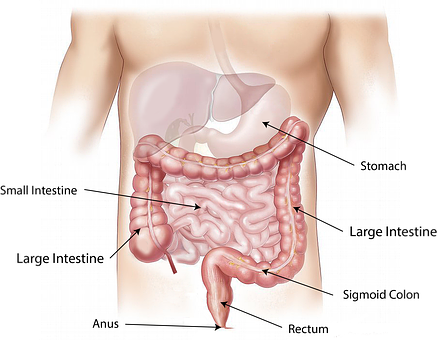Herbivores
The human digestive system is 12 times the length of its body, designed for bulky foods such as grains and nuts. When you compare the human anatomy to those of animals, humans resemble animals that primarily eat plant foods.
A carnivores’s digestive system is 3 times the length of its body. Its stomach has 10 times as much hydrochloric acid as humans in order to expulse the putrefactive bacteria from the rapidly decomposing flesh. They have an almost unlimited capacity to handle saturated fats & cholesterol while humans become quickly diseased.
Because the human body is not designed to digest meat, it becomes a strain and a burden to the system as it struggles to process these “foreign” foods.
The healthier the digestive system, the healthier the body. Consume less processed foods and more plant-based foods. If you experience bloating after eating, try avoiding drinking liquids 15 min before and another 2 hrs after eating.
- the medicinal mushroom Lion’s Mane (Hericium Eranaceus) assists with proper functioning of the Enteric Nervous System (ENS – 500 million neurons contained in the gastrointestinal tract) and the way it communicates with the brain
- Caraway helps reduce bloating, gas & heartburn
- the small intestine gets damaged by salicylates (like Aspirin) and Ibuprofen (like Advil) as well as corticosteroids and certain antibiotics because our digestive enzymes are not equipped to deal with these chemicals
Enzymes that break down our food:
- Protease digest proteins: these are anti-inflammatory and help reduce pain & inflammation and support tissue healing, especially for pain associated with exercise-related muscle soreness & recovery, as well as sinus & dental complaints
- Bromelain comes from pineapples and helps with pain, inflammation & wound healing
- Papain comes from papaya
- try supplements that contain a few different types of proteolytic enzymes but avoid prolongued use – use only on occasion, as needed
- Lipase digest fats
- Carbohydrases digest carbs like starches & sugars
- the Lactase enzyme is required to break down lactose (sugar in milk); people who are lactose-intolerant don’t have enough lactase
- the Alpha-galactosidase enzyme breaks down carbs from beans and veggies
Indigestion
This happens when we have an overgrowth of bad, unhelpful bacteria in our gut:
- add a few pieces of ginger when cooking foods that cause digestive discomfort as the enzymes released make the food easier to digest
- Bromelain (an enzyme supplement) can improve digestion
- take a good quality probiotic & consume fermented foods like Unpasteurized Sauerkraut, Kombucha or Sourdough
- increase your fibre intake from fruits & veggies
Coffee
If you love coffee but coffee doesn’t love you, try Frog Friendly Coffee. It’s full of antioxidants & minerals and has low acidity. It’s the healthiest coffee for people suffering from Crohn’s Disease, Colitis & IBS.
Many people have sensitive stomachs because of all the chemicals & additives included in most of the instant boxed “foods” we buy. Coffee is no different. Frog Friendly coffee grows wild in Mexico’s last remaining old growth stand of pin, mahogany & cinnamon. This is a biologically live environment, not a commercial plantation with a lot of artifical growing conditions that require the use of chemicals or pesticides. These beans are harvested & roasted in an eco-friendly manner to produce a truly organic coffee.
If this coffee doesn’t upset your stomach like your regular coffee, this should speak volumes to you about all the other foods you eat that cause you indigestion. Look at the ingredients list on the labels. If there is a bunch of foreign- sounding names, look for a similar product that is organic & non-gmo and give it a try You might be amazed at how different you feel after eating more natural, unprocessed foods.


